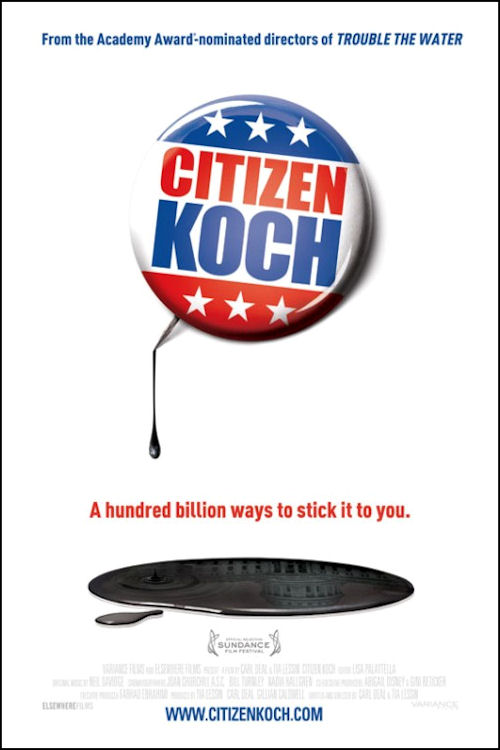Anthony's Film Review
Citizen Koch (2013)

The American issue of money corrupting elections is illustrated vividly in this documentary...
If you have lived in the United States of America since 2008, when Barack Obama was elected President, chances are that you noticed how political ads have increased in number and perhaps gotten dirtier and more persuasive than ever. If you are not aware of this happening or are just barely noticing something going on, you owe it to yourself to see the documentary film Citizen Koch (pronounced "coke," not "cotch"). Directed by Carl Deal and Tia Lessin, Citizen Koch is a fascinating film for anyone knowledgeable about the issue of money and politics and an informative film for anyone who knows little to nothing about it.
Before I discuss the film's main content, let me share my observations of its visual presentation. It shows what any good documentary film shows: video footage, audio recordings, text narration, and interviews with key individuals, all in an engaging and unique arrangement. The sources are carefully chosen to powerfully convey the filmmaker's message and to present at least a bit of the contrary side. Really, if you love good documentaries, you won't be disappointed with this one.
The film's first main segment is about Citizens United. This is a non-profit political group that sued the Federal Election Commission because it felt that its freedom to distribute a film about Hillary Clinton was being restricted. The question was whether the film was, in fact, a political ad, for which different rules applied. Without going into the legal details of the case, just understand that the U.S. Supreme Court decided (inexplicably) that money was speech, corporations had the same freedom of speech as an individual, and campaign finance restrictions for corporations should be overturned. Basically, one person still has a campaign contribution limit, but no such limit exists for corporations, which means that conservative billionaires Charles and David Koch, who run Koch Industries, can funnel tons of money into elections through this loophole.
This leads into the main subject that exemplifies the problem of big money in elections: state-level politics in Wisconsin. In 2010, Scott Walker was elected Governor of Wisconsin as voters believed his promises of improving the state's economy. Instead, he signed into law a bill that would end collective bargaining rights for public workers, which many considered a move to end worker unions. While enough people in Wisconsin signed a petition for an election to recall Scott Walker, they're up against a massive political ad campaign in favor of the Governor, thanks to big corporate money coming in from out of state.
The saga of Wisconsin as presented in Citizen Koch is definitely an emotional ride. You get to hear somber words from ordinary people in Wisconsin who are struggling financially and worry about their future ever since Walker signed that anti-union bill into law. You might also experience shock and anger as you see how much the Koch brothers' money has swayed people in Walker's favor. Then there are clips of town hall meetings for Walker supporters, which can easily disgust you if you are politically liberal.
At this point, I shall mention one more story in the film. You may remember the debates among Republican candidates for the 2012 presidential election, including Mitt Romney, Rick Santorum, Rick Perry, Herman Cain, Michele Bachmann, Newt Gingrich, Ron Paul, and Jon Huntsman. Did you know that there was a Republican presidential candidate who was never invited to any of those debates, perhaps because he was against interests related to big money? That's right. Buddy Roemer, former Governor of Louisiana, ran a grassroots campaign that accepted no special interest money. Unfortunately, as honorable and admirable as that was, it's no match for big money in the post-Citizens United era. No wonder 90% of Americans never knew about him, which is a shame because he really seems like a nice and caring man whom many people would willingly vote for.
The issue of corporate money influencing elections is illustrated in many political news stories, so many that it's not possible for a documentary film to discuss them all. But Citizen Koch did a great job choosing three seemingly unrelated topics and showing us their relation as well as the magnitude of the issue. It's an eye-opening and mind-blowing documentary that appeals to political news junkies, film lovers, and intellectuals. Really, it's a film for everyone, especially all Americans.
(Note: Citizen Koch was originally planned as a documentary to be aired on American public television through the Public Broadcasting Service, but PBS refused to air it because of its critical views of the Koch brothers. The person who had an influential role in that decision: David Koch, one of many people funding PBS. You see? The issue is much bigger than you think.)
Anthony's Rating:










For more information about Citizen Koch, visit the Internet Movie Database.
Home
Film Reviews
Other Reviews
Commentaries
Links
About AFR
RSS Feed
Privacy Policy
E-mail Anthony











